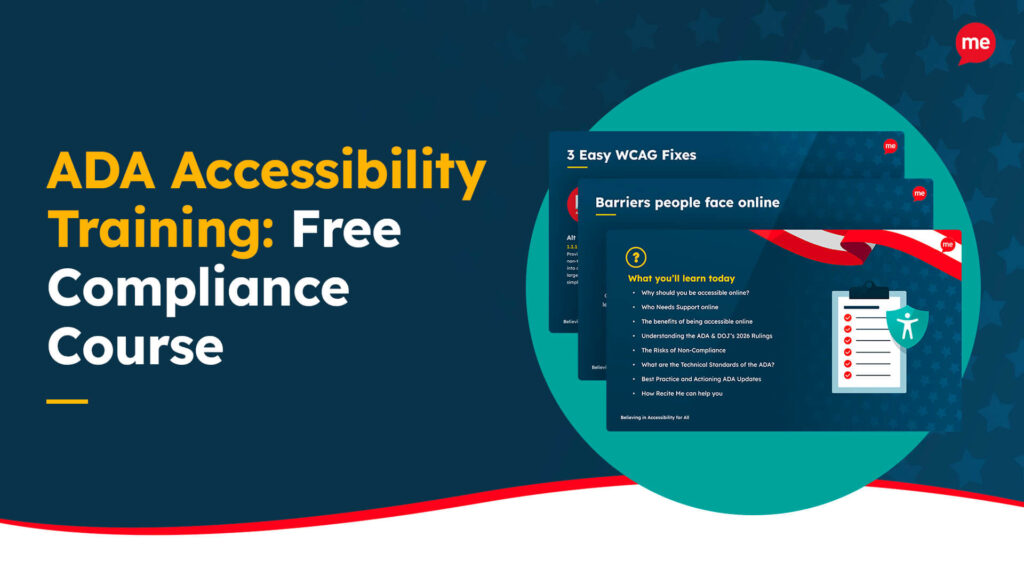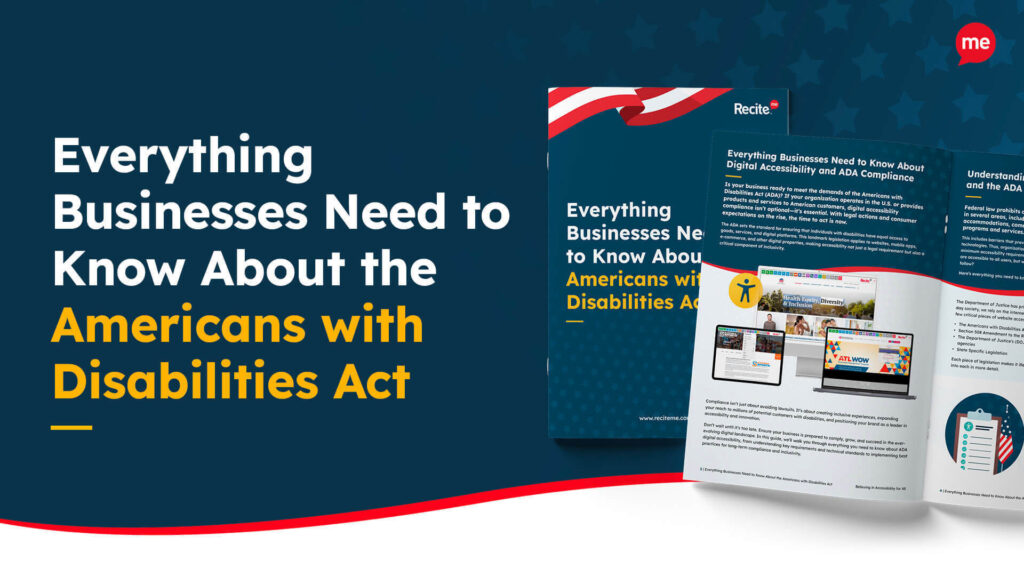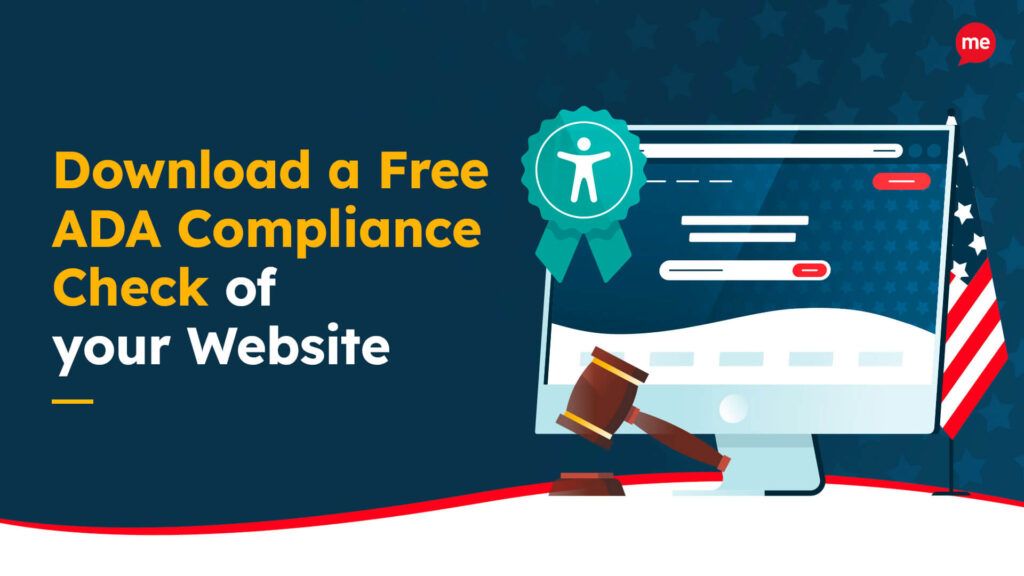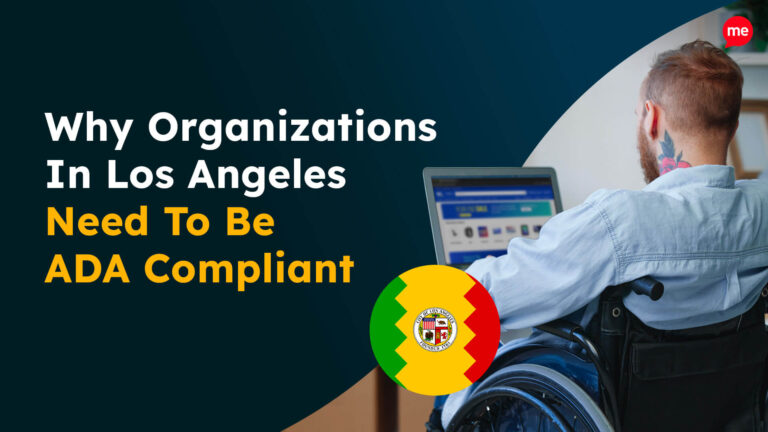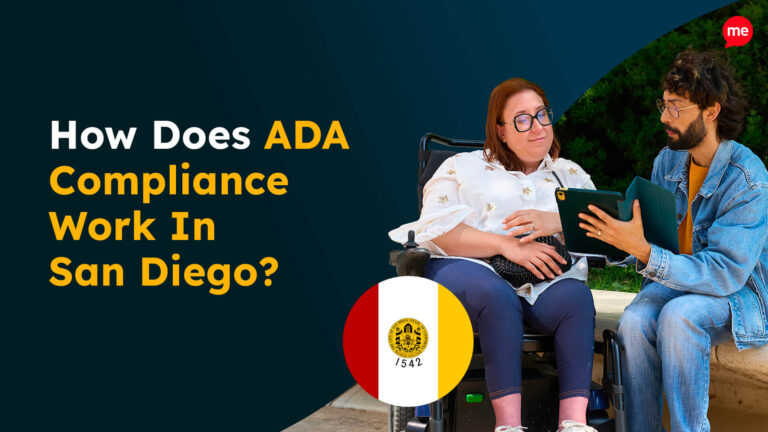Get A Free ADA Compliance Audit Of Your Website
Download NowIf you’re an online website owner based in New Jersey, the chances are you are required by law to comply with the Americans with Disabilities Act (ADA). If this is you, and you’re not already an ADA expert, then it’s time to become one. Because, with ADA lawsuits on the rise, compliance could be the difference between a trajectory of growth and a future laden with legal stresses, reputational setbacks, and financial loss. Ready to take action? Let this article serve as your guiding compass for all things ADA web compliance.
What is the Americans with Disabilities Act (ADA)?
The Americans with Disabilities Act (ADA) was a groundbreaking piece of legislation when first introduced in 1990. At its core, the act serves to stamp out discrimination against disabled individuals across all aspects of society – employment, private businesses, nonprofits, public services, etc.
Details about what the act stands for and who it applies to are wrapped up in five neatly packaged categories, called ‘titles’. By dissecting each title in a bit more detail, we can learn a lot about the ADA and its requirements.

- Title I protects employees with disabilities from discrimination in the workplace.
- Title II requires state and local governments to ensure accessibility in public services.
- Title III mandates accessibility in public accommodations, which includes businesses and non-profit organizations serving the public.
- Title IV focuses on telecommunications, requiring services such as closed captioning.
- Title V contains miscellaneous provisions, including protection against retaliation for enforcing ADA rights.
Although originally focused on physical accessibility, the ADA now includes digital spaces under Title III, as courts view websites as “places of public accommodation” serving the public. Furthermore, in New Jersey, the NJ Law Against Discrimination (NJLAD) complements the ADA, prohibiting discrimination based on disability and ensuring equal treatment.
Want to make sure your website is compliant with the Americans with Disabilities Act? Then unlock the ADA compliance checklist now. Discover actionable steps to ensure ADA compliance, helping you avoid lawsuits and any other negative consequences of non-compliance.
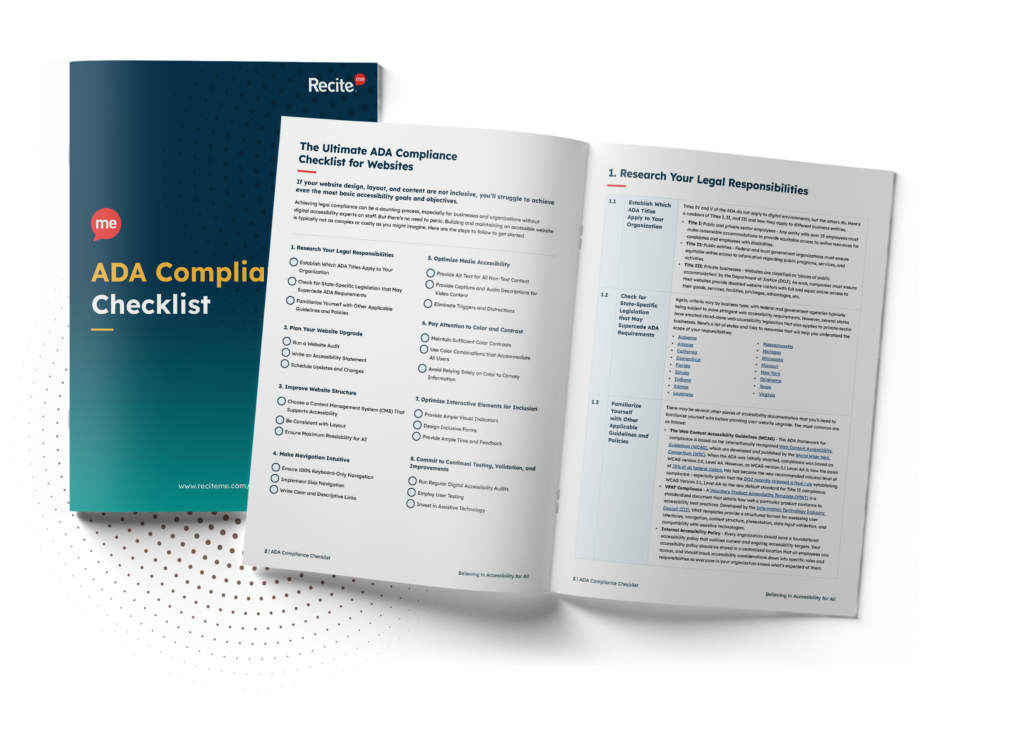
Which New Jersey based organizations need to comply with ADA standards?
If you think ADA requirements don’t apply to your business, think again. The law is broad and encompasses a wide range of organizations. By closely examining each of the act’s titles, we can pinpoint three key details which determine exactly who is subject to the ADA.

- Website owners and private sector businesses: Title III applies to public accommodations, which include retail stores, restaurants, hotels, and online businesses. A New Jersey-based ecommerce store selling artisan crafts online must ensure its website can be accessed by users with disabilities.
- Public sector organizations: Under Title II, all state and local government entities in New Jersey must ensure their digital services are accessible. For example, a public library in Newark must have an accessible website for patrons to browse catalogs or register for events.
- Employers with 15+ employees: Under Title I, employers with more than 15 employees must provide accessible internal systems, like job application portals or employee training platforms, for their employees.
Although rare, there are some small businesses which may technically be exempt from complying with the ADA. However, even for these businesses, ADA compliance is still strongly encouraged. Aside from safeguarding against potential lawsuits, an accessible website helps extend your reach by catering for a broader audience, including the 890,000 New Jersey residents living with a disability.
What are the risks of ADA non-compliance in NJ
So, you’re a New Jersey-based website owner and the ADA applies to you. But why should you care? Well, failing to meet ADA standards constitutes more than a slap on the wrist. Legally, you could face irrecoverable setbacks, but from a business perspective, it could spell disaster for your organization, impacting everything from your reputation to your existing projects and, crucially, your bottom line.
Legal action and lawsuits
Organizations in New Jersey which fail to comply with the ADA make themselves vulnerable to lawsuits from frustrated disabled customers or advocacy groups. If found guilty, ADA lawsuits can quickly lead to fines, which can range from $55,000 for a first offense to $150,000 for subsequent violations. Not to mention, settlement agreements often include additional costs for remediation and legal fees, which can end up crippling small businesses.

Difficulty in achieving compliance later
Failing to ensure ADA web compliance may result in court mandates to impose retroactive fixes. Postponing compliance in this way just leads to more complex and costly changes down the line, as older infrastructure or systems may need to be significantly overhauled in order to meet ADA standards.
Reputational damage
Imagine the headlines: “Local Business Sued for Excluding Customers with Disabilities”. News travels fast, and negative publicity can tarnish your brand image. People want to support inclusive businesses, and failing to meet accessibility standards sends the opposite message. Once public perceptions are set, they can be hard to change.

Lost business opportunities
An inaccessible website excludes those with disabilities from browsing your services or purchasing your products, ruling them out as potential customers. Given that the disabled community makes up an impressive 10% of the New Jersey population, inaccessibility can have a damning effect on your organization’s bottom line. In fact, lack of ADA web compliance doesn’t only alienate disabled individuals, but any potential partner organization who prioritizes inclusivity too.
Loss of competitive advantage
Failing to comply with the ADA as a New Jersey-based business may put your organization at a disadvantage compared to competitors. Businesses that are ADA-compliant attract a wider customer base, including individuals with disabilities. By not meeting accessibility best practices, you risk missing out on business opportunities, market share, and potential customers who may then opt for more inclusive competitors instead.
The most common ADA issues found on NJ websites and how to resolve them
Knowing where businesses commonly falter is the first step to avoiding pitfalls. In this section, we highlight five of the most common ADA web violations in New Jersey and how to address them.
Missing image alt text
Alt text is a description of an image that is embedded within the image’s HTML code, allowing screen readers to interpret it so that visually impaired users can perceive the contents of an image without needing to physically see it. Without alt text, your website becomes inaccessible to screen reader users.
To fix this, add descriptive alt text to every image. Keep the descriptions brief but don’t omit any crucial details. For instance, a bakery in New Jersey showcasing its cakes online might include alt text like, “Chocolate layer cake with raspberry frosting”. This provides enough detail for the visually impaired user to imagine what the cake looks like without overwhelming them with line after line of technical jargon.

Unclear link text
Links with vague text like “Click here” or “Read more” do not provide enough context for screen readers, making it difficult for users to understand the link’s purpose. Instead, use descriptive link text that explains the link’s destination or action. For example, “Read our full accessibility guide” or “View menu options”.
Inaccessible PDF documents
Accessible PDFs are important to ensure screen readers can interpret their content. All PDFs should be tagged properly with accessible formatting. Use tools like Adobe Acrobat Pro or PDF accessibility checkers to ensure the document is readable by screen readers.
Poor color contrast
If there is insufficient color contrast between text and its background, you risk making your content illegible, especially to users with visual impairments. Use online contrast checkers to ensure your website’s palette meets the minimum ratios outlined in the Web Content Accessibility Guidelines (WCAG).
Safe choices include black text on a white background, or dark blue on light gray. But you can even choose to empower your users by allowing them to modify your website’s color scheme, with tools like an accessibility toolbar.
Lack of error identification in forms
Forms that don’t provide feedback about input errors or how to correct them create frustration for all users, particularly those with cognitive disabilities. Ensure clear, concise error messages appear next to problem fields when an error occurs. The messaging should prescribe specific corrective action, such as “Please enter a valid email address,” and should be readable by screen readers.
Get a free automated ADA compliance audit of your website. This audit will highlight compliance violations and provide the recommendations needed to meet ADA compliance standards.
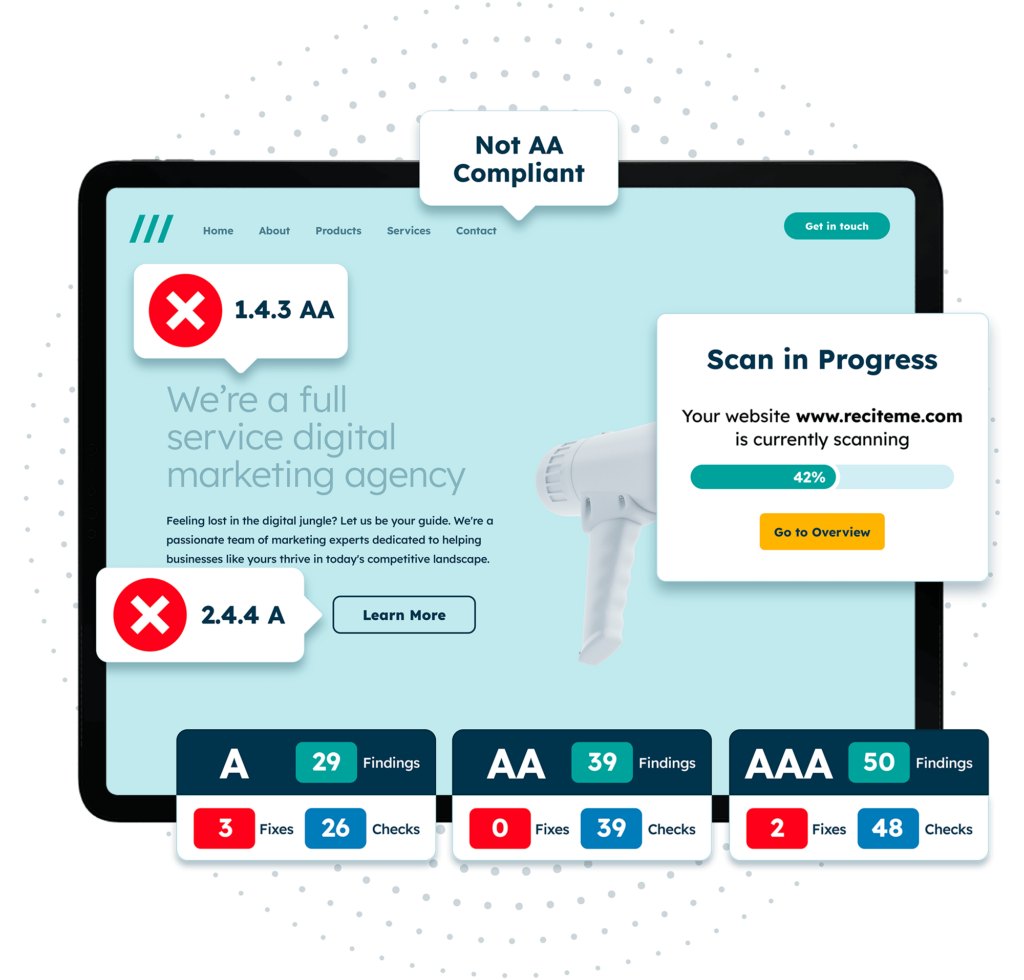
Examples of real ADA lawsuits in New Jersey
ADA-related lawsuits are on the rise. In 2023 alone, more than 4,600 lawsuits were filed across America, highlighting the ongoing battle for compliance. Reflecting on prominent cases can provide a solid basis for understanding common pitfalls and the consequences that follow. Let’s unpack a few real-life ADA lawsuit examples in New Jersey.
Advanced ENT & Allergy v. The U.S. Attorney’s Office for the District of New Jersey
In this case, the U.S. Attorney’s Office for the District of New Jersey reached a settlement with Advanced ENT & Allergy over ADA violations.

The medical practice was accused of discriminating against a prospective patient who was deaf and had low vision by failing to provide in-person sign language interpreters. Instead, the company relied on screen-based, remote services that were inadequate for patients with vision disabilities.
Under the resulting settlement agreement, Advanced ENT & Allergy were required to implement a non-discrimination policy, provide in-person interpretation services when needed, and offer ADA training for employees. The practice will likely be acquired by ENT and Allergy Associates in January 2025.
Roosevelt Care Centers (RCC) v. The U.S. Attorney’s Office for the District of New Jersey
In March 2023, a complaint was filed in federal court against Roosevelt Care Centers (RCC) for violating Title I of the ADA. The RCC was accused of unlawfully terminating a dietary worker with a disability that prevented her from being able to lift heavy objects effectively. Despite her ability to perform essential job functions, the company did not engage in a reasonable accommodation process before firing her.
The U.S. Attorney’s Office for the District of New Jersey settled the case, in which the RCC agreed to pay $50,000 to the plaintiff and also implement ADA training for its staff. Additionally, the RCC was required to submit regular compliance reports to the government as part of the settlement.
Need more help becoming ADA compliant?
The following resources are packed full of actionable tips and expert advice for making your digital content compliant with the Americans with Disabilities Act:
Free ADA Accessibility Training
Take the first step to ADA compliance by completing our training course.
Free ADA Accessibility Guide
Ensure your organization is meeting the requirements for ADA compliance.

